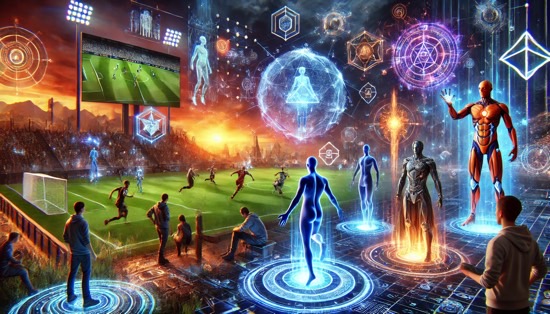How AI Is Transforming NPCs and Gameplay

TL;DR:
AI is reshaping gaming by creating lifelike NPCs with adaptive behavior and emotional intelligence. Learn how these innovations are driving dynamic gameplay, emergent storytelling, and smarter sports game opponents.
Introduction:
Gaming has come a long way since the days of static, repetitive NPCs that seemed more like talking billboards than actual characters. Thanks to AI, we’re stepping into a world where NPCs feel more alive, adaptive, and even emotionally intelligent. From smarter sports game opponents to immersive narratives that respond to your choices, artificial intelligence is transforming how we play and experience games. Let’s explore how AI is leveling up gaming.
The Evolution of NPCs: From Static to Dynamic
Remember when NPCs just repeated the same dialogue over and over? It was charming—for about five minutes. Those days are history, thanks to AI. Today’s NPCs are more than just filler; they’re complex, adaptive, and sometimes even a little too clever for their own good.
Adaptive Behavior
AI-driven NPCs are rewriting the rules by analyzing player actions and adapting in real time. Think about an NPC that remembers your choices and tailors their responses to reflect past interactions. It’s like having a friend who actually pays attention (looking at you, Todd from Accounting).
Key benefits:
- NPCs learn from your gameplay style.
- They can create unique interactions based on your choices.
For example, in Red Dead Redemption 2, your relationship with NPCs can evolve based on how you treat them. Ignore someone’s greeting? They might remember that snub and call you out later.
Emotional Intelligence
AI has brought emotional depth to NPCs, allowing them to react authentically to your actions. Whether they’re delighted by your generosity or outraged at your betrayal, these characters feel more human. This emotional realism pulls players deeper into the narrative, making every decision carry weight.
Real-world example:
Games like The Last of Us Part II use AI to create NPCs with believable emotional responses, from grief to fury.
AI in Sports Games: A Whole New Ball Game
While NPCs in RPGs steal the spotlight, sports games are quietly leveraging AI to take realism to the next level. It’s no longer just about pretty stadiums and slick animations—it’s about gameplay that feels like you’re up against real competitors.
Learning Your Playbook
Ever spammed the same play over and over in Madden, only to have the computer opponent suddenly shut it down? That’s AI at work. Machine learning algorithms analyze your patterns and adapt, forcing you to mix things up or face the consequences.
Dynamic Difficulty Adjustment
AI ensures games stay challenging but fair by dynamically adjusting difficulty. Struggling to score? The AI might dial back the defense. Crushing your opponents? Get ready for them to bring their A-game.
This makes sports titles like FIFA and NBA 2K more engaging and prevents frustration—or overconfidence—from derailing your fun.
The Impact on Gameplay and Storytelling
AI isn’t just making games harder or NPCs smarter; it’s fundamentally changing how stories unfold and how players interact with their virtual worlds.
Emergent Gameplay
AI-driven NPCs create opportunities for emergent gameplay—unscripted moments that even developers didn’t anticipate. These surprises keep games feeling fresh, even after multiple playthroughs.
Example:
In Skyrim, the Radiant AI system allows NPCs to make decisions based on their environment, leading to unexpected interactions like townspeople fighting over a dropped sword.
Deeper Narratives
Branching narratives have long been a staple of RPGs, but AI is pushing this to new heights. NPCs now remember your actions, resulting in ripple effects across the game world. Your choices no longer lead to simple “good” or “bad” endings—they create nuanced, evolving stories.
Games like Cyberpunk 2077 showcase this with NPCs who react to your decisions, creating a living, breathing city that feels uniquely yours.
The Future of AI in Gaming
What’s next? AI in gaming is still in its infancy, and the possibilities are mind-blowing. Imagine:
- NPCs capable of natural language conversations.
- Game worlds that adapt to your preferences in real time.
- Procedural content generation that keeps games fresh indefinitely.
Developers are already experimenting with these ideas. AI is on track to become the dungeon master of digital adventures, crafting experiences tailored to every player.
FAQ
1. What is adaptive AI in gaming?
Adaptive AI allows NPCs or opponents to learn from a player’s actions and dynamically adjust their behavior or difficulty.
2. How does AI improve storytelling in games?
AI enables NPCs to remember your choices and actions, creating branching narratives and emergent gameplay that make each play unique.
3. Are there downsides to AI in gaming?
While AI adds depth, some players feel it can make games overly challenging or unpredictable, potentially alienating casual gamers.
Conclusion:
AI is no longer a side character in gaming—it’s the star of the show. Whether it’s creating emotionally intelligent NPCs or designing smarter, adaptive opponents, AI is redefining what’s possible in virtual worlds. As technology continues to evolve, the line between reality and gaming blurs even further, promising an exciting future for players everywhere.
So, the next time an NPC remembers your name—or a computer opponent outsmarts your best move—take a moment to appreciate the cutting-edge AI making it all possible. Now, if you’ll excuse me, I’ve got some NPCs to impress.
Call to Action:
What’s your favorite example of AI in gaming? Share your thoughts and ideas about how this will enhance your favorite AI-powered game moments! Let’s keep the conversation going.